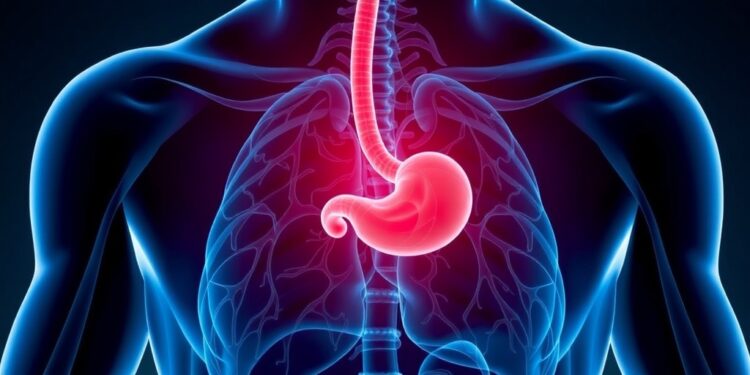In a groundbreaking study recently published in the journal Nature, a collaborative team of scientists has conducted an in-depth analysis of somatic mutations present in the gastric epithelium, the lining of the stomach. This research is crucial as it sheds light on the mutational processes that occur in the stomach, some of which may lead to the development of gastric cancer, a significant health concern worldwide. This comprehensive exploration was undertaken by notable institutions including the Wellcome Sanger Institute, Broad Institute of MIT and Harvard, and the University of Hong Kong, emphasizing the collaborative nature of modern scientific endeavors.
Stomach cancer, known scientifically as gastric cancer, ranks as the fifth most prevalent cancer globally, accounting for nearly one million new cases in the year 2022. It is alarming to note that this form of cancer contributes to the third highest number of cancer-related deaths around the world. Predominantly affecting populations in East Asia and South America, understanding the underlying mutational dynamics within the gastric lining is vital for devising preventive strategies and developing innovative therapeutic approaches.
The researchers delved into somatic mutations by sequencing whole genomes from samples derived from individuals with and without gastric cancer. Focusing on 238 samples of normal gastric gland tissue from 30 individuals located in Hong Kong, the US, and the UK, this study employed advanced techniques such as laser capture microdissection. This precision dissection method allowed investigators to selectively isolate individual gastric glands, paving the way for detailed genomic analyses that reveal how mutations accumulate over time.
Significantly, despite the stomach’s harsh acidic environment, the researchers discovered that the mutation rates in the gastric epithelium resemble those of most other cell types in the body. This finding suggests a remarkable intrinsic protective mechanism present within the stomach lining that safeguards its cells from the potential toxic effects posed by acidic contents during digestion. Such insights enhance our understanding of gastrointestinal biology and open avenues for investigating how normal tissues can develop resilience against environmental insults.
However, the investigation revealed striking phenomena among patients diagnosed with gastric cancer. Observations indicated that glands identified as normal but sourced from cancer patients exhibited changes at the microscopical level, resembling early transformations indicative of cancer development. The presence of increased mutations within these normal glands likely suggests a latent risk factor for gastric cancer, hinting at the delicate balance between benign cellular alterations and malignant transformation.
Moreover, the research team uncovered instances of chromosomal abnormalities, specifically the occurrence of trisomy, where certain gastric cells possessed three copies of chromosomes 13, 18, and 20. This phenomenon, absent in prior studies of different tissues, alludes to a possible exposure to an unidentified mutagen affecting a subset of individuals. Such anomalies put forth compelling questions regarding the external environmental factors that may influence mutation rates, prompting further investigation into their potential roles in gastric carcinogenesis.
A noteworthy facet of this study is the observation that nearly 10 percent of the stomach lining contains ‘driver’ mutations. These are genetic alterations that directly facilitate cancer progression, and the prevalence of such mutations escalates in individuals experiencing chronic inflammation—a well-established risk factor for gastric cancer. This correlation raises essential questions about the underlying biological mechanisms and the pathways linking chronic inflammatory conditions to the emergence of cancerous cells.
Dr. Tim Coorens, an influential author contributing to this research, articulated the significance of examining somatic mutations within normal tissues acquired over a lifetime. By understanding these early-stage cellular alterations, researchers can formulate hypotheses regarding the onset and progression of gastric cancer, enhancing current cancer biology paradigms. This study’s findings serve as a stepping stone toward constructing comprehensive mutation maps of the gastrointestinal tract, providing valuable comparisons with other organ systems affected by cancer.
The study also emphasized the role of external factors in driving mutational processes in gastric carcinoma. The revelation of unique age-related mutations among the study participants posits that mutations accumulate over time, contributing to the risk of developing gastric cancer. Such mutations serve as biomarkers for ongoing research aimed at identifying those at greater risk and interventions that may counteract these processes before malignant transformation occurs.
In conclusion, the implications of this study are vast, as they pave the way for future investigations into the mutational landscape of the gastric epithelium. The ongoing exploration of genetic changes in not only gastric tissue but across various anatomical sites provides an essential tool for understanding cancer biology broadly. Furthermore, this research underlines the power of multidisciplinary approaches and advanced genomic techniques in unraveling the complexities of cancer development, which may ultimately lead to novel prevention and treatment strategies aimed at combating cancers with significant global impact.
This investigation into somatic mutations presents a compelling narrative of how one organ system can illustrate the broader questions of mutation and cancer. The findings call for continued experimental rigor and collaborative efforts to further elucidate the intricacies of cancer development in the stomach, as well as in other organs, reinforcing the notion that such studies may hold the key to unlocking new frontiers in cancer research and therapeutics.
Subject of Research: Somatic mutations in gastric lining tissue and their relationship to gastric cancer
Article Title: The somatic mutation landscape of normal gastric epithelium
News Publication Date: 19-Mar-2025
Web References: Wellcome Sanger Institute
References: Coorens et al. 2025, Nature DOI: 10.1038/s41586-025-08708-6
Image Credits:
Keywords: Stomach cancer, somatic mutations, gastric epithelium, cancer research, genetic mutations, driver mutations
Tags: collaborative cancer researchearly stages of gastric cancerEast Asia stomach cancer statisticsgastric cancer prevention strategiesgastric epithelium mutationsgenetic factors in stomach cancerglobal stomach cancer prevalenceNature journal cancer studysomatic mutation analysisstomach cancer researchtherapeutic approaches for gastric cancertriggers of stomach cancer





